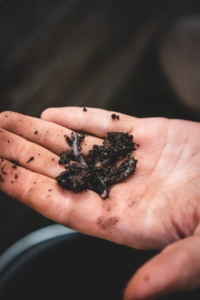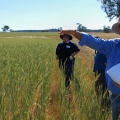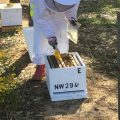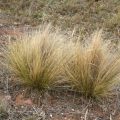It all starts with soil!
Published 20th August 2021. Written by Maddison O’Brien
One teaspoon of healthy soil holds up to one billion bacteria, several yards of fungal filaments, several thousand protozoa, and scores of nematodes. The soil is alive with an unfathomable diversity of organisms! This vast ecosystem beneath our feet supports all life on earth, and it’s where the food chain begins and ends. The food you eat daily relies on living soil to grow. Our water and air quality are improved with healthy soil too! Scientific research has come a long way in the past few decades to understand the critical importance of soil to all life on earth! Now there is a spotlight on soil to help reverse the effects of climate change by capturing and storing carbon dioxide from the air in the form of organic matter in a process known as carbon sequestration.
Plants play an essential role in carbon sequestration removing carbon from the atmosphere through photosynthesis and then “fixing” much of that carbon in their tissue and soil. Over time, plants die or get eaten by animals and return to the soil as litter; this creates soil organic matter, which is extremely rich in nutrients and carbon. Healthy soils mean stronger carbon reservoirs and healthier plants, which then continue to take carbon out of the atmosphere, build more soil organic matter, and promote new plants’ growth, providing a feedback loop that could help bring the system back into balance.

We all want to make a profit and leave a legacy for future generations. By thinking about ways to draw down carbon dioxide and store it in the soil and vegetation, we can also start to see significant productivity and environmental benefits that improve long-term profitability and resilience.
Watershed Landcare is hosting Guy Webb from SoilCQuest to talk about Soil Carbon! Get your questions answered and find out about the latest research and technology. The workshop is an opportunity to get practical advice on how you can achieve benefits such as improved water retention, nutrient cycling, grow more nutrient-dense and robust vegetation and crops, support biodiversity, and improve the overall resilience of your land.
Guy Webb and the team from SoilCQuest are doing some fascinating work. They have been working with microbes and have isolated strains of fungi that rapidly store carbon. This research is exciting because it can allow fast, long-term sequestration, which we need in a world of increasing C02 levels in the atmosphere. Here’s your chance to learn about soil or integrating a soil carbon strategy into your agricultural enterprise. Join the free online workshop on 26 August at 2021 6 pm. To register and for more info, go to trybooking.com/BTLEH.
We’re here to help, get in touch with Maddison at Maddison@watershedlandcare.com.au – Local Landcare Coordinator if you want to get involved or have any questions.








